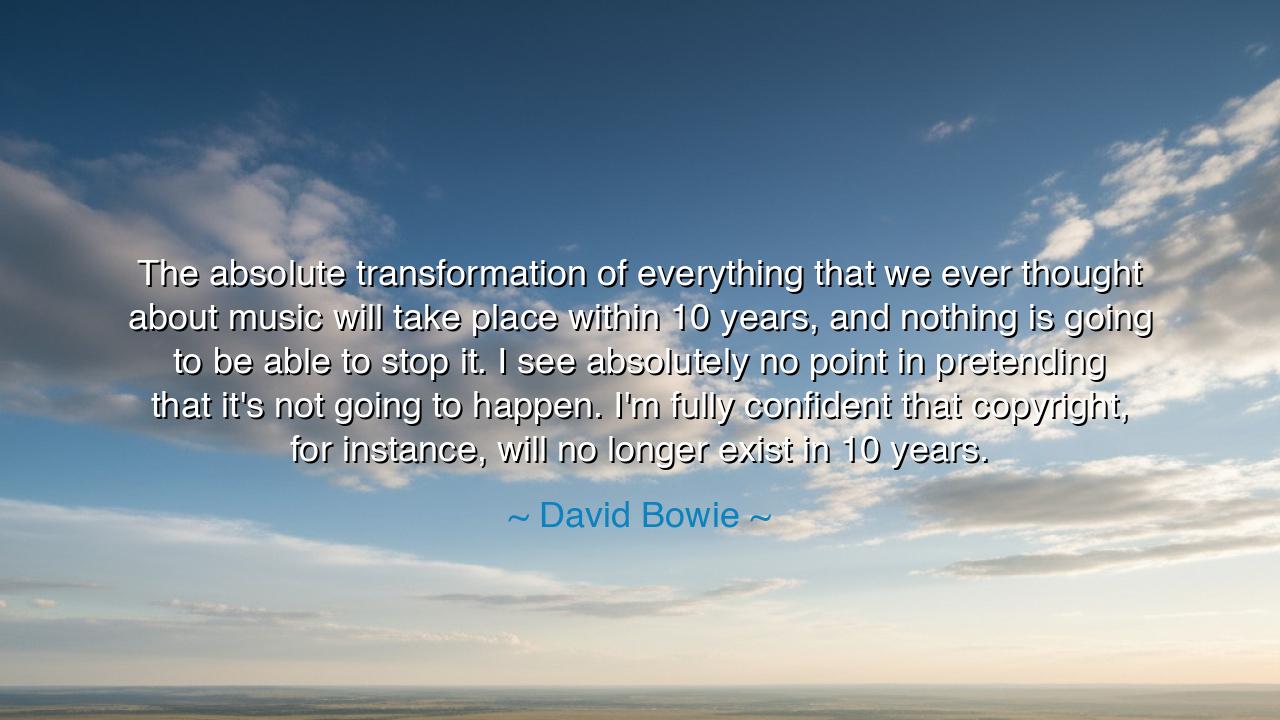
The absolute transformation of everything that we ever thought
The absolute transformation of everything that we ever thought about music will take place within 10 years, and nothing is going to be able to stop it. I see absolutely no point in pretending that it's not going to happen. I'm fully confident that copyright, for instance, will no longer exist in 10 years.






David Bowie, the chameleon of sound and vision, once declared with prophetic clarity: “The absolute transformation of everything that we ever thought about music will take place within 10 years, and nothing is going to be able to stop it. I see absolutely no point in pretending that it’s not going to happen. I’m fully confident that copyright, for instance, will no longer exist in 10 years.” These words, bold and unsettling, stand not only as a prediction but as a revelation of the eternal law of change. For Bowie saw, as few did, that music—that sacred art born of breath and heartbeat—was on the verge of an upheaval greater than any the world had known.
The ancients themselves knew this truth: that nothing in creation remains fixed. Rivers carve new paths, empires rise and fall, languages shift, and songs, too, evolve. The lyres of Greece gave way to the chants of monks, which yielded to the harmonies of symphonies, which were later shattered and reborn in jazz, rock, and hip-hop. Bowie, speaking in his age, declared that we were entering yet another great transformation—an age where technology would unchain music from its old masters, where the old laws of ownership and copyright would wither, and music would flow like water, unstoppable, uncontained.
Consider how his prophecy unfolded. With the dawn of the internet, music was no longer bound to vinyl, cassette, or compact disc. It dissolved into invisible streams, accessible to all, carried by digital winds. Napster appeared, followed by iTunes, then Spotify and YouTube. Suddenly, the power of record labels—once the gatekeepers of art—began to collapse. Bowie had foreseen it: the sacred fire of song, once locked in guarded temples, now leapt freely across the world, unshackled from walls of profit. It was not destruction, but a new creation—a redefinition of how humanity would experience and share the gift of sound.
Bowie’s words also echo with warning. He spoke of the collapse of copyright, not in malice, but as a recognition of inevitability. The old structures that chained music to ownership would crumble before the sheer force of digital transformation. Some would mourn, others would rage, but the tide could not be turned back. Here, Bowie revealed his true genius: he was not only an artist of songs, but a seer of futures. He accepted the coming change with open arms, while many clung in vain to the old order.
The meaning of his teaching is profound: to resist the flow of change is to be broken by it, but to embrace it is to be reborn. Bowie reminds us that the artist must be unafraid of transformation. Just as he shed one persona after another—Ziggy Stardust, the Thin White Duke, the Blackstar—so too must we learn to shed old ways of thinking. Whether in music or in life, the world will change beyond our control. The wise do not fight the inevitable; they ride upon it, shaping its direction with courage and imagination.
The lesson for us is timeless: do not fear the death of old forms. Every ending is the seed of a new beginning. Just as Bowie foresaw the transformation of music, so too will our crafts, our labors, our very identities be reshaped by forces beyond us. The choice we face is whether to cling and be crushed, or to release and create anew. The strong soul does not merely endure change—it uses it as fire to forge the future.
Therefore, let each of us live as Bowie lived: bold, imaginative, unafraid. In our own work, our own art, our own lives, let us not waste time in denial, pretending that the tides will not rise. Instead, let us adapt, experiment, and embrace the flow. For the world will be transformed, whether we consent or not—but those who prepare, who imagine, who welcome change, will not be destroyed by it. They will be the ones to shape it.
Thus David Bowie’s words endure as both prophecy and command: the transformation of music, and of life itself, is unstoppable. The question is not whether it will come, but whether we will embrace it. To those who dare to let go of old cages, who dare to leap into the unknown, there awaits not destruction but creation. For change is not the end—it is the music of eternity itself.






AAdministratorAdministrator
Welcome, honored guests. Please leave a comment, we will respond soon